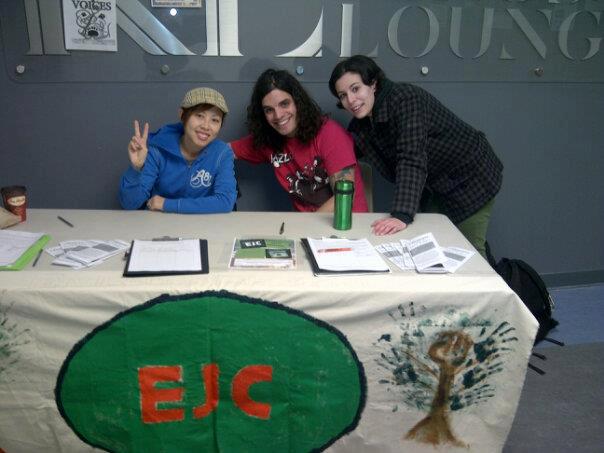A small group of George Brown College students have moved from apathy to action and created the Environmental Justice Collective

Environmental Justice Collective members at George Brown College encourage students to sign a petition against Line 9 on
Feb. 13. From Left to right Hân Hanna Lê, Brendan Soaera, and Brandice Moniz. Photo: EJC/Facebook
By Alena Khabibullina
Staff Reporter
Climate change, energy conservation, air quality, land pollution, nuclear safety, water crisis, oil spills, resource depletion, logging, the impact of mining and many more are the environmental issues that are growing daily.
Unfortunately, the number of environmental activists is much smaller than the scope of ecological problems.
However, there is a small group of George Brown College students and graduates who moved from apathy to action and created the Environmental Justice Collective (EJC) within the Student Association.
According to the constitution of the EJC its mission is “to raise awareness about environmental destruction: what is causing it and how it can be stopped”
Michael Waglay, an administrative co-ordinator and last year’s president of the collective, helped organize the group of students that founded the EJC: Chris Bourque, D’Arcy Farrell, Hanna Le, Crystal Robitaille, Melisande Pittl-Meier, Emily Green and Brendan Soares. All are students of the Community Worker Program that educates students in social justice and human rights.
A big issue for the EJC is Enbridge’s Line 9 pipeline that startled environmental organizations and activists across the province.
“Line 9 is so important to us because Enbridge is planning to pump hot, abrasive and corrosive tar sands through an aging pipeline that runs through our city. If a rupture were to occur, which is likely given the heat and abrasion, then our water supply could be contaminated and our air would be poisoned with benzene and other known carcinogens,” said Waglay. “A similar disaster, involving a similar pipeline and tar sands crude, occurred in Kalamazoo Michigan in 2010 and the area has still not recovered from the spill.”
The small group of student activists, along with other Canadian environmental organizations, went into battle against the tar sands. According to leading climate scientist James Hansen the tar sands will be “game over for the climate”. In February, the collective took the initiative and collected about 60 students’ signatures against the Line 9 project on a petition.
The EJC is not only active on environmental problems but also on social justice, anti-oppression and anti-poverty issues since the club started its work.
“We are also interested in building strong partnerships with the Aboriginal constituency at the college as we recognize that the issues we are working on disproportionately affect these communities. Many Aboriginal communities are calling for sovereignty and are among the most vocal and active supporters of sustainability, and I feel that these communities need to be given more opportunities to lead in the environmental movement,” said Waglay.
Volunteering their time by organizing public events, holding meetings and doing outreach, the EJC members are trying to spread the word about environmental movements that directly impact the college community and build students’ activism towards environmental issues happening off-campus.
“We hosted a few public meetings last year and one film screening on global mining abuses and a Peruvian community that continues to resist the destruction,” said Waglay. “This year we plan to host one public meeting on the third Wednesday of every month, and offer free food at the meeting.”
The EJC’s next meeting will be on Sept. 18, at 4 p.m., in room B155 Career Services, at St. James campus, 200 King Street East. The EJC is planning an event called “Canada’s Carbon Bomb” in December which will be dedicated to the tar sands and will bring a prominent speaker to the college.
Waglay believes that a campus group has enormous potential and they are eager to meet new members from all programs, “this will be an important year to inform the uninformed, and inspire the informed to act.”

